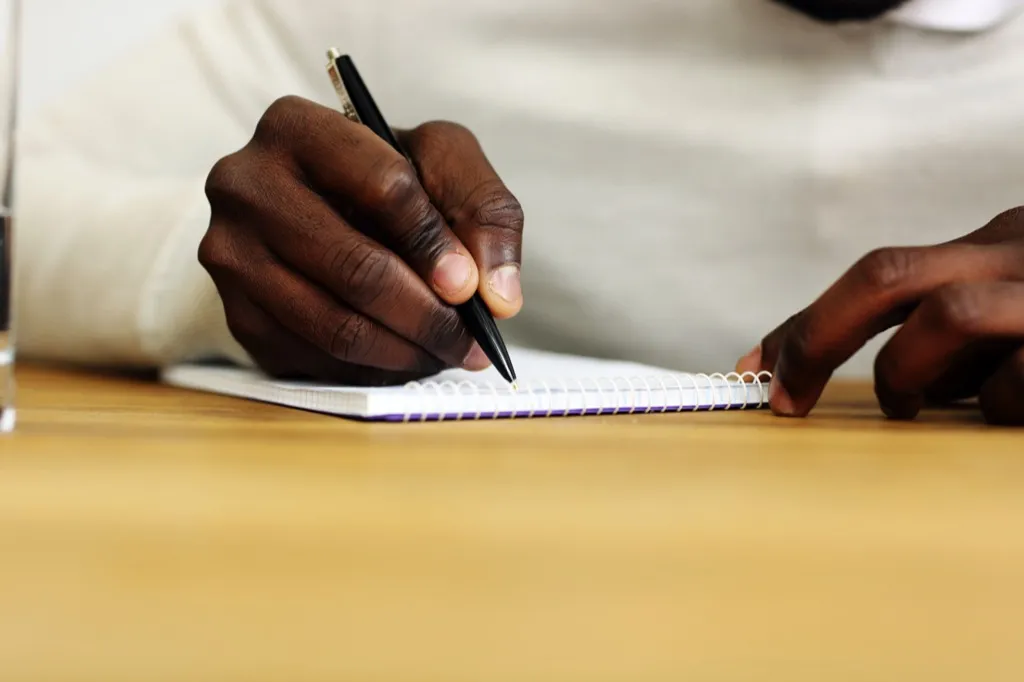20 Signs You're Terrible at Making Decisions
It's high time you stop being your own worst enemy.

Whether it's something as innocuous as what shoes to wear or something as major as, well, what to major in, decision-making is often a daunting prospect. What if you make the wrong choice?! You could wind up on a career path you hate (or worse: spending a day walking around with shoes that just totally don't work with that look).
But while decision-making can give any generally well-equipped adult pause, it can also give power. Being able to call the shots when the time comes is an essential skill if you want to navigate the waters of the world with aplomb. And yet, it's a skill that few care to learn—often without recognizing the detriment such negligence can cause.
If that sounds even remotely like you, read on. We've consulted a panel of experts to find out all the telltale signs that you regularly struggle with the decision-making process. It's time to stop being your own worst enemy—and to start wearing better shoes.
1
You're a hapless perfectionist.

"Being a perfectionist can make it very difficult to make decisions and feel confident in the decision that you do eventually make," says Adina Mahalli, a certified mental health professional. "The thought of making a wrong decision consumes a perfectionist, which can lead to anxiety and shame when they think they have made the wrong decision."
Making any decision invites a certain amount of risk, and that can make a perfectionist panic, because perfectionism doesn't allow any room for surprises or failure. If this is the case for you, try to remember that, in many situations, it's okay to revise or change your decisions on the fly. You needn't get things perfectly right the first time.
2
You overthink every little thing.

Does picking out an outfit for the evening send you careening into an existential crisis? If so, this may stem from a deficit in the decision-making department. "If you're bad at making decisions you'll find that you often overthink not only decisions, but every aspect of your life. You may find it difficult to let things go and your mind is always switched on, replaying past events," says Mahalli.
Decisions require critical thought, but over-analyzing to a certain point only means you're getting in your way. Instead, make your choice, and try your best to move on.
3
You grew up with controlling parents.

Not all people with controlling parents end up with poor decision-making skills, but it can be a factor.
"If your parents or caregivers were overly critical or overly controlling, you may never have learned to trust your own decision-making skills," says psychotherapist Christine Scott-Hudson. "If your parents overly controlled what you should study and/or selected every extra-curricular hobby you've had from kindergarten through senior year of high school, you may have experienced some challenges once you went off to college and were in charge of your own decision-making."
Independently making decisions for yourself is a skill that has to be honed on your own. If you want to excel at it, you have to first recognize that you grew up with controlling parents—and then break free from that control. Pro tip: start by choosing your own hobbies.
4
You're a Sisyphean people-pleaser.

In a Butterfly Effect-like way, making a decision means, potentially, you'll disappoint someone, somewhere. If you frequently find yourself striving to ensure everybody is happy all the time, when it comes to personal decision-making, you'll have to set that aside.
"People that have the habit of people-pleasing might find that they're generally bad at making decisions. They've rarely had to make their own decisions because they're happy to go along with whatever everyone else wants. This can mean that, when it comes to making their own decisions, they're not sure where to start," says Mahalli.
5
You're a pro-level procrastinator.

Like eating, drinking, and sleeping, procrastination is a basic human urge—and exponentially so for those who struggle with making decisions. "One of the ways in which people avoiding making decisions is to put them off until the last minute," says Mahalli. "Often, this means that they're left with no choice at all—because there's only one option!"
If you find yourself procrastinating, take the time to decipher why. There's a good chance it's because you don't feel secure in your decision-making skills and are attempting to avoid testing them out.
6
You shy away from leadership roles.

To lift a line from Spider-Man, with great power comes great responsibility. If the idea of taking the reins on a work project has you quaking in your boots, it may be because you're resistant to making big decisions.
"As a project manager, I see managers delaying decisions through fear of what the outcome might mean, or worry that they don't have all the data," says Elizabeth Harrin, a project management blogger and the author of Project Manager: Careers in IT Project Management.
7
You have major self-confidence issues.

If you feel insecure about yourself, naturally, you'll feel insecure about your decision-making. "People who can't make decisions often lack self-confidence," says psychiatrist Vinay Saranga, M.D. "They don't believe in themselves enough to the point where they have trouble deciding things." The key is to remember that, when it comes down to it, no one knows you like you do. If you're making a choice, chances are, it's the right one.
8
You never give yourself deadlines.

If you find yourself pushing your choices further and further back ("I'll figure it out tomorrow…"), that's a clear-cut sign you have trouble making choices. Thankfully, there's an easy way to combat such decision-making malaise: treat each choice like an assignment, and give it a hard deadline.
In fact, Saranga even suggests going so far as to give yourself a forced time limit. "Tell yourself that you're going to decide one way or the other in 20 minutes, an hour, or whatever works for you," he says. "Set a literal timer and, when the alarm goes off, force yourself to choose."
9
You consult your friends about every little move in your dating life.

It's fine—and even helpful—to listen to your friends' advice when it comes to dating. But, at the end of the day, you're in charge of your relationships and therefore you should ultimately be the only one making the decisions about them.
"Any decision within dating or relationships is a personal one. If you find that you're constantly going to your friends to help you make your relationships decisions, then you have someone to blame when the relationship doesn't work out," says Mahalli. In other words, relying on your pals for concrete relationship advice is a total cop-out. Listen to their advice, but make the decisions yourself.
10
You take forever to get ready.

We all know that person: They'll be ready in 10 minutes…45 minutes ago. Whether you're that person or not (we'll kindly let you keep that secret), there's an easy trick to stopping the practice once and for all: start running a tallied list.
Whenever you catch yourself (or, um, a friend) spending the better part of an hour choosing an outfit, write down the date, and write an X next to it. If you (or, right, your friend) ends up just going with the very first outfit they selected, write down two Xs. After a few weeks, take a look at the list. Chances are, you (or your friend!) will start to see far more XXs than Xs. This should drive home the point to always just go with that first outfit.
11
You don't value your own opinion.

"One of the most obvious signs that you might not be good at making decisions is if you just let other people make decisions for you," says Mahalli. "While it's okay to receive input from others, you should have an inner voice that also has an opinion. If you can completely disregard that voice and blindly take the advice of others, you're not actively deciding anything."
Whether in professional or personal life, making yourself heard can be intimidating—but it's something you have to actively work on if you want to start calling the shots. The first place to start: stop tuning out that voice in your head.
12
"I don't care" is your go-to response.

When someone asks you what you'd like to do, do you find yourself automatically saying something, "It's up to you," and then being disappointed when the evening eventually results in a thing you don't like? That's a surefire sign that you are unwilling to make decisions, even when deep down you wish you could. Saying you don't have an opinion or a desire to give your input on a decision can become a habit that you don't give much thought to, so try being more present when asked what you'd like to.
13
Tasks as small as deciding where to go for dinner give you anxiety.

These days, especially if you live in a metropolitan hub, it can feel like you're presented with too many dining options to count. (In fact, to take it from a recent New York Times report, "there may be too many restaurants.") For those who struggle with decision-making, this can easily cause panic. What if you get food from a new place and it's rotten? Or tastes bad? Or, worst of all, isn't a large enough portion?
The thing to remember is that limitless food options are a good thing! Instead of panicking over the sheer amount of potentially delicious food at your fingertips, turn it into a game. Try to avoid repeat-eating at the same restaurant in a 60-day span. Worst case, you have a bad meal or two. Best case, you find a bunch of new amazing places to chow down.
14
You're risk-avoidant.

Yes, humans are creatures of habit. That said, if you're stuck in a rut of a routine, that may be because you have trouble making decisions. Risks both big (leaving a steady job to pursue a passion project) and small (trying a new breakfast spot) require some level of choice and commitment. So try taking the plunge from time to time. Don't think about the bad things that will happen if a choice doesn't pan out. Think about how great the rewards will be if it does.
15
You find it difficult to talk about your interests.

In small talk, interests and preferences often come up in conversation. If such chatter makes you shut down, it might not be because you don't have any interests—it might be that you aren't willing to decide what they are. Give yourself the headspace to figure out what they are, and then engaging in small talk might not feel so painful.
16
You hate planning events.

Making plans requires an entire string of decision-making, especially when you're putting on an event. You have to choose a venue, a guest list, decorations, refreshments, and on and on.
Yes, being in charge of an event comes naturally to some, but, to others, it causes wild anxiety. If you're in the latter camp, remind yourself that, whatever bash you're throwing, it'll probably go off without a hitch. After all, there's one factor that can't possibly get screwed up: people love people. Get a bunch of them in a room together and they're bound to have a great time—no matter how lackluster the party favors are.
17
You have a crippling fear of making the wrong decision.

"Some people figure that not making a decision is better than making a wrong decision, and this can result in passive indecisiveness," says Mahalli. If you feel like running away from decision-making will bring you relief, it's time to practice doing the opposite. Like a strength-training regimen, the more effort you put into making decisions, the easier it will get. Neglecting that muscle, however, will only result in atrophy.
You let the decision-making process get in the way of the activity.

Maybe you're the kind of person who thinks they should be in charge of decision making, but then takes things way too far. If you take so long researching activities and places to go that, by the time you choose one, everyone is tired and annoyed, you might not be as good at it as you think. Overdoing things is never healthy, so remember to be mindful of the amount of time you're allocating to making a decision. (Twenty minutes should be more than enough.)
19
You don't trust your gut.

We're told to always go with our gut, but doing so doesn't come so naturally to everyone. If following your instincts feels like a challenge, you probably just need some practice. It does make perfect, after all. "Certain important life decisions do require important consideration, but when it comes to those smaller less significant choices, try to just go with the first thing you feel," recommends Saranga.
What's more, recent research suggests your gut is actually connected to your nervous system. In other words, if you have a "gut feeling," it's almost certainly correct. Trust it.
20
You live life by the toss of a coin.

Making decisions based on which side of the coin lands on your palm is not making a decision at all. It's a total cop-out. Leave this move to Batman villains and try creating your own fate.
To discover more amazing secrets about living your best life, click here to follow us on Instagram!





















